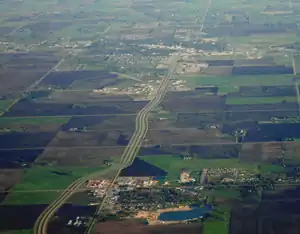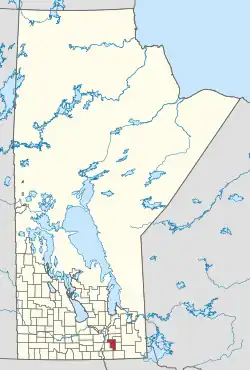Rural Municipality of Hanover
The Rural Municipality of Hanover is a rural municipality (RM) in southeastern Manitoba, Canada, located southeast of Winnipeg in Division No. 2.
Rural Municipality of Hanover | |
|---|---|
 Steinbach (upper) and Blumenort (lower) as seen from the air. | |
 The Location of the RM of Hanover in Manitoba | |
| Coordinates: 49°26′36″N 96°50′57″W | |
| Country | Canada |
| Province | Manitoba |
| Region | Eastman |
| Incorporated | May 25, 1881 |
| Amalgamated | 1890 |
| Government | |
| • Reeve | Jim Funk |
| Area | |
| • Total | 730.44 km2 (282.02 sq mi) |
| Elevation | 268 m (879 ft) |
| Population | |
| • Total | 17,216 |
| • Density | 23.6/km2 (61/sq mi) |
| Time zone | UTC-6 (CST) |
| • Summer (DST) | UTC-5 (CDT) |
| Website | http://www.hanovermb.ca/ |
It is Manitoba's most populous rural municipality and fourth-most populous municipality overall (behind the cities of Winnipeg, Brandon, and Steinbach) as of the 2021 census.
History
The area of Hanover was part of the traditional lands of the Ojibway-speaking natives. In the summer of 1871, the federal government signed treaties with these people and relocated them to reserves such as the Roseau River Anishinabe First Nation to the south and the Brokenhead Ojibway Nation to the north.[2]
From the lands left behind, the Manitoba government set aside the East Reserve, slightly smaller than what is now the RM of Hanover, for Plautdietsch-speaking Mennonites immigrants from the Russian empire. In 1873, these Mennonites signed an agreement with the Canadian government known as the Privilegium, which guaranteed land, freedom of religion, private schools, and military exemption.[3]
The East Reserve was divided into two municipalities in the early 1880s, as most of the southern Manitoba was organizing itself into new rural municipalities.[3] In 1880, the north part of the East Reserve became the Rural Municipality of Hespeler, named in honour of William Hespeler, who had brought many of the Mennonite immigrants to the area. The RM of Hanover, to the south, was established on 25 May 1881. The two municipalities shared administrative staff and merged into the single municipality of Hanover in 1890.[3]
Other settlers in the area were mainly French and Anglo-Saxons.[3]
The neighbouring city of Steinbach and town of Niverville were originally within Hanover but are now separate urban municipalities. Steinbach was first incorporated in 1946 (as a Town) and Niverville in 1969.[4] Hanover's municipal headquarters were located in Steinbach until a new office building was constructed near Mitchell in 2001.[5]
Demographics
Hanover is the province's most populated rural municipality, ahead of the Rural Municipality of Springfield, and fourth-most populated municipality overall, slightly behind the City of Steinbach. In the 2021 Census of Population conducted by Statistics Canada, Hanover had a population of 17,216 living in 5,141 of its 5,305 total private dwellings, a change of 10.8% from its 2016 population of 15,540. With a land area of 730.44 km2 (282.02 sq mi), it had a population density of 23.6/km2 (61.0/sq mi) in 2021. The largest communities in Hanover are the local urban districts of Mitchell, Grunthal and Blumenort, which have populations of 2,828, 1,782 and 1,778, respectively.[6]
|
| |||||||||||||||||||||||||||||||||||||||||||||||||||||||||||||||||||||||||||
| Panethnic group | 2021[8] | 2016[9] | 2011[10] | 2006[11] | 2001[12] | |||||
|---|---|---|---|---|---|---|---|---|---|---|
| Pop. | % | Pop. | % | Pop. | % | Pop. | % | Pop. | % | |
| European[lower-alpha 1] | 14,915 | 87.07% | 14,440 | 92.21% | 13,015 | 93.4% | 11,455 | 96.95% | 10,460 | 97.71% |
| Indigenous | 1,410 | 8.23% | 995 | 6.35% | 740 | 5.31% | 305 | 2.58% | 185 | 1.73% |
| Southeast Asian[lower-alpha 2] | 265 | 1.55% | 25 | 0.16% | 15 | 0.11% | 0 | 0% | 0 | 0% |
| African | 220 | 1.28% | 105 | 0.67% | 45 | 0.32% | 35 | 0.3% | 10 | 0.09% |
| Latin American | 95 | 0.55% | 50 | 0.32% | 55 | 0.39% | 15 | 0.13% | 15 | 0.14% |
| South Asian | 65 | 0.38% | 10 | 0.06% | 35 | 0.25% | 10 | 0.08% | 10 | 0.09% |
| East Asian[lower-alpha 3] | 45 | 0.26% | 20 | 0.13% | 15 | 0.11% | 0 | 0% | 30 | 0.28% |
| Middle Eastern[lower-alpha 4] | 45 | 0.26% | 10 | 0.06% | 0 | 0% | 0 | 0% | 0 | 0% |
| Other/multiracial[lower-alpha 5] | 20 | 0.12% | 10 | 0.06% | 0 | 0% | 0 | 0% | 0 | 0% |
| Total responses | 17,130 | 99.5% | 15,660 | 99.54% | 13,935 | 99.35% | 11,815 | 99.53% | 10,705 | 99.22% |
| Total population | 17,216 | 100% | 15,733 | 100% | 14,026 | 100% | 11,871 | 100% | 10,789 | 100% |
| Note: Totals greater than 100% due to multiple origin responses | ||||||||||
Transportation
Hanover is served by three provincial highways: PTH 52, PTH 12, and PTH 59; the latter two link the municipality with the City of Winnipeg, the provincial capital. There are no major rivers or rail lines running through Hanover; however, the Canadian Pacific Railway's Emerson subdivision forms a portion of the municipality's boundary with the Rural Municipality of Ritchot.[13]
The Steinbach South Airport is a privately-run airport located within municipal boundaries near Steinbach.[14]
Communities
- Local urban districts
- Other communities
- Barkfield
- Blumenhoff
- Bristol
- Friedensfeld
- Hochstadt
- Pansy
- Randolph
- Rosengard
- Sarto
- Tourond
Notes
- Statistic includes all persons that did not make up part of a visible minority or an indigenous identity.
- Statistic includes total responses of "Filipino" and "Southeast Asian" under visible minority section on census.
- Statistic includes total responses of "Chinese", "Korean", and "Japanese" under visible minority section on census.
- Statistic includes total responses of "West Asian" and "Arab" under visible minority section on census.
- Statistic includes total responses of "Visible minority, n.i.e." and "Multiple visible minorities" under visible minority section on census.
References
- "Census Profile, 2021 Census of Population, Rural Municipality of Hanover". Statistics Canada. February 9, 2022. Retrieved February 9, 2022.
- "History and Heritage of Roseau River First Nation". Retrieved July 1, 2010.
- "RM of Hanover History". RM of Hanover History. Archived from the original on May 30, 2010. Retrieved July 11, 2010.
- "The Town Of Niverville Celebrates 50th Anniversary". SteinbachOnline.com. September 9, 2019.
- "Hanover office officially opens". The Carillon News. April 5, 2001.
- "Population and dwelling counts: Canada, provinces and territories, and census subdivisions (municipalities), Manitoba". Statistics Canada. February 9, 2022. Retrieved February 20, 2022.
- Goldsborough, Gordon (February 11, 2022). "Manitoba Communities: Hanover (Rural Municipality)". Manitoba Historical Society. Retrieved March 27, 2022.
- Government of Canada, Statistics Canada (October 26, 2022). "Census Profile, 2021 Census of Population". www12.statcan.gc.ca. Retrieved April 29, 2023.
- Government of Canada, Statistics Canada (October 27, 2021). "Census Profile, 2016 Census". www12.statcan.gc.ca. Retrieved April 29, 2023.
- Government of Canada, Statistics Canada (November 27, 2015). "NHS Profile". www12.statcan.gc.ca. Retrieved April 29, 2023.
- Government of Canada, Statistics Canada (August 20, 2019). "2006 Community Profiles". www12.statcan.gc.ca. Retrieved April 29, 2023.
- Government of Canada, Statistics Canada (July 2, 2019). "2001 Community Profiles". www12.statcan.gc.ca. Retrieved April 29, 2023.
- "RM of Hanover Living". RM of Hanover. Retrieved May 25, 2022.
- "New show filming scenes at Harv's Air". steinbachonline.com. November 9, 2022.
